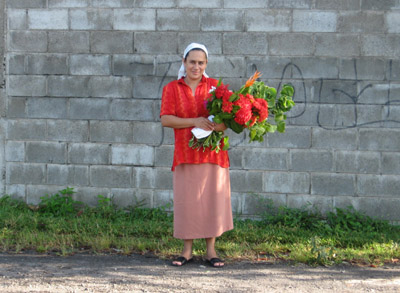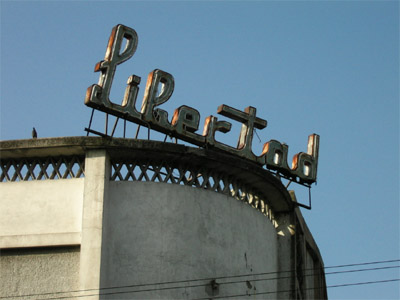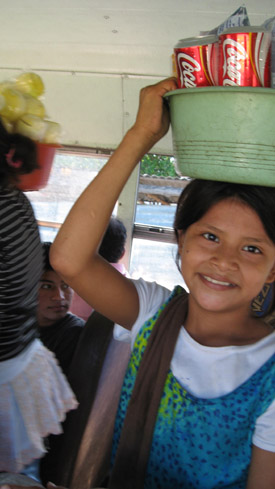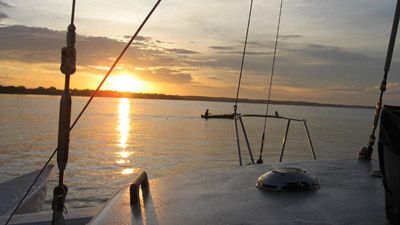El Salvador
November 16th, 2006 by: cheyenne
[Jeff took this photo of a woman near where we kept the boat; she was waiting for the bus.]
For having the Time Machine in El Salvador four and a half months, I’ve said embarrassingly little about it, blogwise. I guess I didn’t really know how to cover all that was going on around us every day, because it wasn’t just one thing to describe or one event where I may have made an ass of myself that I needed to tell everyone. There were so many things. And so many different ways I made an ass of myself.
If I had to sum up the whole of the country with a few words, I’d have to say the thing that struck me the most was the unbelievable friendliness of the people. However, I’m generally not one for using only a few words. And, I know I say this about everyplace we go: Oh, the people were SO nice, blah blah. There is a huge class divide in the country: the very rich and very conspicuous consumers and then the very poor, which of course is by far the majority of people in El Salvador. Most we met lived in tiny houses built out of scavenged parts, had swept dirt floors, and had wood-fire cooking hearths. It has been only less than a decade since the civil war ended (it went on for around twelve years) and clearly economic and political tensions remain. And yet nearly everyone we met was courteous, nice, extremely helpful, and genuinely curious about what the hell we were doing there.

In San Salvador, a city cram packed with people on the streets, people being moved around in diesel-spewing ex-American school busses, and just major mayhem almost everywhere you look, we frequently were approached by random people to chat. Many of them just want to know where we are from because they have a relative or some connection with the States (it is assumed generally that we are Americans) and they love to list off the names of the US cities where a daughter or a cousin lives. Los Angeles, Houston, Chicago. One woman who started talking with us was all but scandalized when she found out we were staying in such-and-such a hotel. She got out a pen and paper and wrote down her home address and telephone, then the telephone and address of her work, also a number of some friend where she might also be if not at home or work, and finally a schedule of hours where she should be at all times of the day, just in case. If we looked confused at any time on the street, some lady would approach us and ask if we needed directions or help. Immediately four or five women would crowd around, and every one of them would have an encyclopedic knowledge of the convoluted San Salvadorian bus schedules and they would all argue over which route was the best, since there seemed to always be about a million different ways to do everything in that city.
Buses were also awesome for people watching as well as actual people interacting. One guy, a schoolteacher on the Puntilla (the end of the land near the entrance of the estuary where we kept the boat), struck up a conversation with us. “Elvis,†he said, “Graceland,†and he nodded giving us a knowing look. This of course came out like, “Ale-vees†and “Gros-ay-land,†and it took us a minute to figure it out. He said he would very much like to visit the US if only so he could visit Maim-feece. He showed us his notebook, which had Elvis on the cover; on the other side, he had pasted in an image of Marilyn Monroe. Another time, on a packed bus, a young girl was standing in the aisle outside of the seat where Joshua and I were sitting. She stared at us for a minute or two and then pointed at Joshua’s shirt and said, “shirt.†Then smiled. She then went on to list our surroundings, “Woman, bus, red, tree, music,†while we repeated the words and others in Spanish. “Bye,†she said when she got off. Usually, I ended up sitting next to older women who would always ask me whether I had any children, and how old I was. Once they confirmed that Joshua was indeed my husband, they would always let me know that it of course wasn’t too late, but that I had to get a move on. One woman even reached over and patted my belly when she told me this. It wasn’t only the women who were concerned at my lack of offspring; men would also be sure to tell me so as well; it wasn’t just some woman thing.
We spent a lot of time on busses in El Salvador, also. Curiously, everyone we met NOT in El Salvador said of the place, “Oh, El Salvador is so dangerous. You, being a foreigner, must really be careful. Don’t ride busses, especially—those are the worst.†Well, maybe we were just lucky but we never had any problems unless it was getting correct change back from the cobradores (the money-taker dudes). Almost always the cobradores were helpful and not only sure to tell us if we had the right or wrong bus, but would often lead us around to where they could point out where to stand to catch the right one. Busses were almost always decommissioned school busses from the US, often downright antiques. They were always fitted with a bar running the length of the ceiling over the aisle to hold onto, plus extra seats were added where they could be, like in front next to the bus driver or on top of the engine hump. Usually the outsides were decorated with fancy mud flaps, chrome paraphernalia, or painted with Dios slogans. The insides were always, always decorated. The most popular themes being large shiny stickers of cartoon characters (generally Warner Brothers) with twee sayings like, ‘Even though you may be far away, remember that I will always love you and hold you close to my heart;’ dangling stuffed cartoon characters (also usually Warner Brothers—I’m talking Tweety and Yosemite Sam and the like); and those spring-loaded hair clips things—I have no idea why—like, dozens of them clipped all around the rear-view mirrors and up and down the window frames and stuff.
The bus driver always has control of the music situation and would either play reggaeton (a latin combination of reggae and hip-hop with an omnipresent beat) or thee schmaltziest, most painfully awful early 80s lite rock ballads. And they always play it loud. Hits like “She’s Like the Wind,†“Cherish the Night,†and “Total Eclipse of the Heart.†Plus a LOT of Bryan Adams, “I Do it For You,†or whatever that one is called—by far my personal least favorite song in the entire planet, particularly the live duet featuring some Celine Dion clone, a most nauseating version.
The cobrador’s job is to collect passengers and then collect their fares. We figured they must be paid some sort of percentage of what they take because they all but jump out of the moving bus and grab people off the street to fill the bus. Wait, actually they DO do that. They hang out of the open bus doors as it barrels down the street shouting and whistling while the bus driver honks all over the place. The bus will always stop for a passenger and while it is still braking, the cobrador is out the door in order to hustle the person onto the bus as fast as possible. The moment the passenger’s foot touches the bottom step of the entry, the cobrador slaps the side of the bus twice and the driver hits the gas. The cobrador swings on like a monkey as the bus roars off using an elaborate system of bars that have been welded around the doorway. They are true artists of brinkmanship and prefer to wait until the absolute last moment to snag the bar and swing back onto the accelerating bus. I always secretly hoped I’d see perhaps a green one get left behind and would imagine him running behind the bus yelling, passengers staring. Sometimes they would slap the bus and swing not into the front door but wait until the bus was almost past to snatch up the rungs outside the back door. I never saw one left behind. Once on the bus, it’s up to the new passengers to keep themselves from flying headlong down the aisle no matter if it’s a little old lady or a mother carrying a kid or what. When it’s time to get people off the bus, the cobrador does whatever he can to facilitate this exit, snatching up luggage, market baskets, kids, and depositing them swiftly on the side of the road.

Then there are the bus vendors. They congregate in certain towns and at major crossroads and all load up on the bus with their plastic bins of pupusas, sodas, coconut water, candies, fried fish, sandwiches, chips, oranges, cut-up veggies, bags of plums—pretty much everything. They all have their own calls: “Quiere pupusas!†“Quesadillas le doy!†“Naranjas dulces!†Sometimes they would get on the bus and deliver an entire sales speech; one guy had wallets and keychains with lights in them and he went ON, detailing all the kinds of things you could put in this wallet. Another particularly successful salesman always had some crazy Japanese treat—gummy pops of anime characters or something—and he would go on about all the delicious flavors and how they were all colors of special and when he got around to selling them, he would sell them all. Every time.
There are only a couple things of note regarding El Salvadorian costume. In general, they dress pretty normal, similar to what you might see elsewhere in Central America or Mexico; we never noticed any specific regional dress like you see in Guatemala, for example. The men seem to favor soccer shirts of their favorite teams (soccer–“football‖is huge, as it is everywhere in the world outside of the US). Women (younger, that is) don’t seem to dress particularly modestly; for example, tube tops seemed to be popular—especially with the larger set. Market and street vendor women always wear these elaborate frilly aprons with bows and ruffles and pockets across the front. The aprons are longer in the front where the pockets are and wrap ruffles all the way around the waist. I’ve never seen them elsewhere and every single women involved with food vending wears one. One more thing: El Salvadorian women, particularly the older women, do not travel anywhere without a towel. They always have one slung over a shoulder, which they use to cover baskets, wipe sweat from their faces, pad their head if they carry stuff, etc. Douglas Adams would be proud.
Our boat was anchored in an estuary (Estero de Jaltepeque) way down off this narrow point of land and there were no towns of any real size anywhere nearby. There were a number of local people who lived there but the majority of land was owned by rich San Salvadorians who had vacation homes, plus a few resort hotels here and there (also catering, it seemed, primarily to wealthy San Salvadorians). During the weekdays, it was dead quiet but on weekends, the hotels and vacation houses would fill up and people would arrive with their extended families to tear shrieking around the estuary on rented jet skis and cruise around in little power boats. The music would pump loudly out the loudspeakers at the hotel and at night you could hear off-key karaoke coming from somewhere near the naval station. During the weekends, our favorite restaurant Mar y Sol, which was located on a breezy dock stretching out over the estuary, would open and we would unabashedly eat there every meal.
Mar y Sol was run by a family and the spokesperson for the cruisers was Teresa, the cute, dimpled twenty-something daughter who waited tables. She had just started taking a weekly English class in San Salvador when we were getting ready to leave and would now and then say “bye†or carefully pronounce your bill in English, then giggle, embarrassed. She often charged us different prices for things and sometimes forgot dishes we had ordered but she was a sweetheart and very judicious with all the awful Spanish she had to endure when we talked with her. It was hard to stay irritated at Mar y Sol for anything because of her.
Living on the estuary in the boat was often boring and always incredibly hot. Mornings generally were still and the early sun would drive us from the cabin by 7am where we would sit in the cockpit crammed into the only shady corner squinting up and down the river watching the action (not a lot, usually). Luckily, the boat provided tasks right and left and we spent our days sanding, painting, sanding, repairing, and sanding. The river had at times several knots of tide and the boat often sounded as if it were underway with the rushing water. Aside from one day at La Paz where we were testing out the bote motor mount, this was the first time we really used the outboard on the dinghy. Rowing against a six-knot current is really tough. At night it was generally breezy and all the major clouds that had built up around the volcanoes during the day started flickering and moving around. During July, every night we got a major thunderstorm that came roaring up the estuary. All would be still and then within five seconds, the temperature would drop ten degrees as a blast of storm air hit, smelling of electric mixer and pine needles. The boat would vibrate and the rigging would scream. We would leap up from bed or eating dinner or whatever we were up to at the time and run around the boat, removing our shade structure lest it get blown to shreds, securing all our miscellaneous deck clutter, pulling the dinghy up onto the ama (lest it gouge a hole in the side of the boat with its evil rivets). Then we would climb below and listen to the noises and the pounding rain, peeking up periodically to make sure we hadn’t moved or to watch with fascination at Angel, George’s boat, flying around as if underway. The squalls lasted usually an hour and then everything would quiet down again. Sometimes there would be two or three per night; mornings were always clear and beautiful.
Bahia del Sol, despite the scary bar entry, turned out to be a really good place for us to keep the boat in a lot of ways. We were able to leave the boat on our own anchor the entire period (although moorings were available as well) and have Santos, a local guy, keep an eye on it when we were away. We could not have found a less expensive alternative anywhere else. The biggest drawback for us was the bar, which kept the estuary from being a place you could just enter and exit at leisure, and the curious and oftentimes uncomfortable political climate created by the “landed interests†(as one of the cruisers put it) clashing with the locals and each other. After the mysterious generator heist (which, upon investigation, turned up alleged ‘evidence’ pointing toward the conspiracy theory), we were ready to leave.



November 16th, 2006 at 4:31 pm
I love your account of the people of El Salvador. It is amazing that the people are so open and helpful and friendly, given the years of terror and civil war. I’m surprised there wasn’t more paranoia and suspicion. Great photos of the people going about their lives. Love, Mom/Peg
November 30th, 2006 at 12:34 am
Talked to Tucker the other day and caught up with your
family. He suggested I might enjoy your account of your
travels…Am fascinated with your experiences…It is
great that you can do this and it is an ideal time when
you are young and capable. Will look for more…Thanks…
July 15th, 2007 at 1:25 pm
Amazing, just wonderful. I just came back from El Salvador 2 weeks ago, and I was hungry to know if any body else had caught the essence of the place and their smiling people. I was told also, that the country was dangerous, to be “careful” and such. My companion and I saw, nor felt such danger, our experince if put in words would mirror yours minus the boat :)
You should’ve vivited Suchitoto, La Palma, and Ataco. The first, a very beautiful colonial town with no or very few vehicles on the roads and charming old buildings. (great restaurants too)
The country; very different from Mexico and other Central American nations as you know. but it was the people that struck us the most, there was such honesty and warmth to them.
Best regards,
Dennis Sosa-Julè